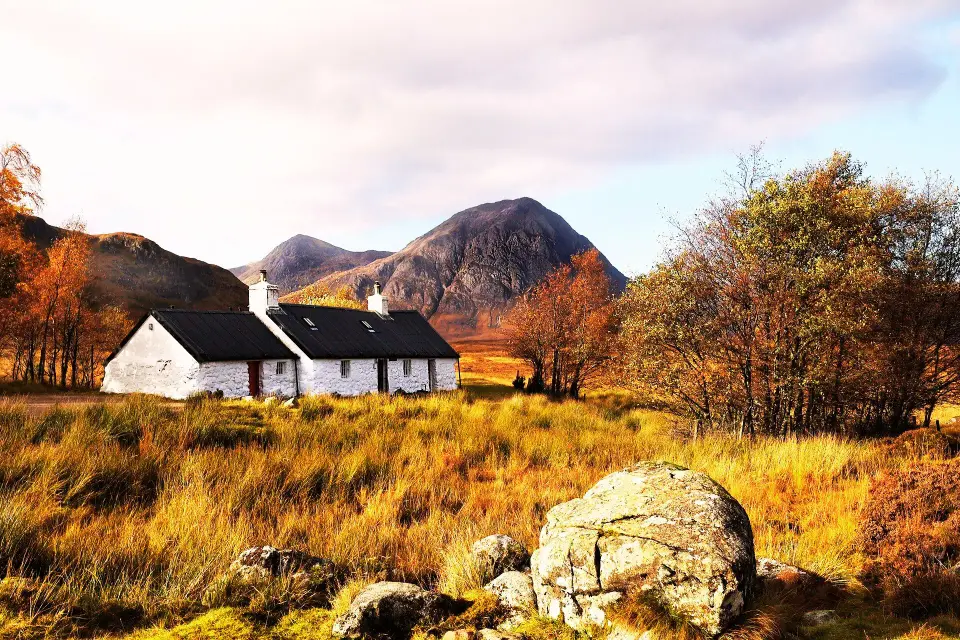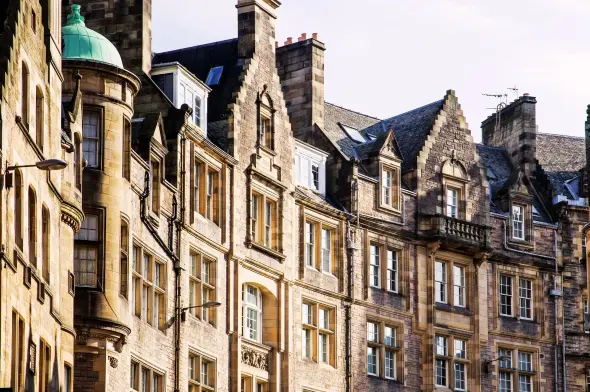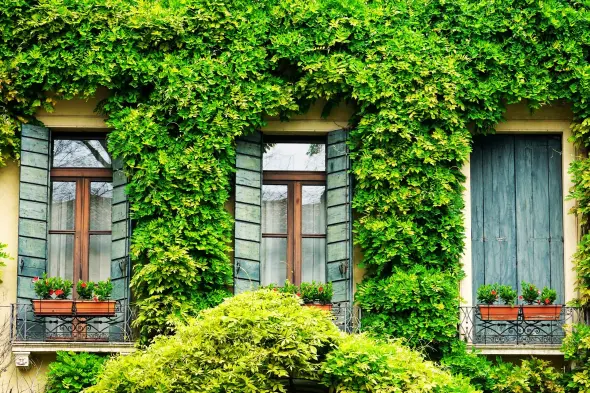Airbnb Rules in Scotland

Scotland, with its breathtaking landscapes, rich history and vibrant cities, has long been a magnet for travelers from around the globe. But as Scotland’s tourism industry thrives, the surge in short-term lets has brought about challenges for local communities and policymakers alike.
To address these challenges, Scotland has introduced new regulations for short-term rentals, shaking up the landscape for Airbnb hosts.
So, how do these regulations affect you and what steps can you take to stay compliant? Let’s break it all down and help you prepare for a successful hosting journey in Scotland’s stunning corners.
Tourism In Scotland
In 2024, Scotland's tourism industry continues to thrive, bolstered by an influx of visitors compared to pre-pandemic levels. Latest statistics reveal a surge in tourism, with more travelers choosing Scotland as their destination.
Recent reports highlight an increase in international visitors contributing significantly to Scotland's economy through expenditure and extended stays.
In response to evolving visitor preferences, the tourism sector has adapted to emerging travel trends. The beauty and charm of this remarkable country continue to draw tourists from around the world as Scotland positions itself as a premier destination.
The Impact of Airbnb in Scotland

Airbnb has become a popular accommodation option for travelers visiting Scotland. The platform offers a wide range of listings throughout the country, from city apartments to rural cottages and everything in between.
Some of Scotland's most popular destinations for Airbnb travelers include Edinburgh, Glasgow, the Scottish Highlands and the Isle of Skye. According to NatureScot, tourism is one of Scotland's seven fastest-growing businesses providing more than £4 billion to the Scottish economy each year.
The natural environment is an important tourism feature with vistas and landscapes being the most compelling reasons for international travelers to visit Scotland.
Airbnb has also had an impact on the Scottish tourism industry with many hosts using the platform to supplement their income by renting out spare rooms or holiday lets. If you're looking to invest in vacation rental properties in Scotland, this is a growing opportunity, especially in areas like the Highlands.
A study by Crown Pavilions found that the Scottish Highlands hosts can expect to earn the most from Airbnb with an average income of £77 per night or £539 per week. A weekly profit of £340 is higher than the average across the whole of the UK.
New Airbnb Regulations in Scotland

Short-term let licensing in Scotland
Short-term let licensing in Scotland involves navigating local laws designed to regulate the booming short-term rental industry. From October 1, 2023, possessing a short-term let license before accepting bookings is mandatory. Prior to accepting bookings or hosting guests obtaining this license is imperative.
Operating without one is a criminal offense, potentially resulting in a £2,500 fine and a one-year ban from license application during which short-term letting activities are prohibited.
Those who utilized their property for short-term letting before October 1, 2022 and submitted a license application before October 1, 2023, can continue offering short-term lets while awaiting application processing.
Types of short-term let licenses
1. Home sharing
This license allows you to rent out all or part of your own home while you are living there. It's suitable for individuals who wish to earn income by hosting guests in their primary residence.
2. Home letting
With a home letting license, you can let all or part of your own home while you're not present. This includes scenarios such as renting out your property while on vacation or participating in home exchanges with others.
3. Secondary letting
This license is for letting properties where you do not normally reside. It includes second homes or holiday lets that are not your primary residence.
4. Home-letting and Home-sharing
With this license you can let out all or part of your own home both while you are living there and while you are away. It provides flexibility for hosts who may alternate between living in and renting out their property
What license do you need? Find out here.
What to know when applying for a short-term let license
Existing host
Existing hosts had until October 1, 2023 to apply for a license if they were already providing short-term lets before October 1, 2022.
The council may request evidence of prior short-term letting activity before October 1, 2022, during the application process.
Hosts can continue letting their accommodation while awaiting the council's decision on their license application.
New host
New hosts must apply for and obtain a license before commencing short-term letting activities.
It is illegal to accept bookings or host guests without a valid license. Failure to comply may result in a fine of up to £2,500 and a one-year ban on license applications.
Transitional period
During the application processing period, hosts can continue offering short-term lets if they used their accommodation for this purpose before October 1, 2022, and applied for a license before October 1, 2023.
Councils have up to 12 months to process applications for existing hosts and up to nine months for new hosts. If a decision is not reached within these timescales an automatic one-year license may be granted unless the courts grant an extension.
License duration
The local council determines the duration of the license.
The first license can last for up to 3 years from its issuance date.
This framework ensures compliance with regulations and clarifies the application process and license duration.
How to apply for a short-term rental license
Your accommodation will need to meet mandatory conditions. Your local council may also set additional conditions.
If your accommodation is in a short-term let control area it is a condition of the license to have or have applied for planning permission.
If it is not in a control area and you do not have planning permission you may still need this to obtain a short-term license. You should check with your local council's planning department to find out.
License fees will likely vary across local councils and depend on the size and capacity of your property.
Penalty for hosting without a license
Accepting bookings or accommodating guests without obtaining a license beforehand is illegal. Failure to apply for a license in a timely manner could result in severe consequences.
You may face fines of up to £2,500 if you fail to acquire a license before offering short-term lets.
You could also be banned from applying for a license for one year.
During the period without a license you will not be allowed to offer short-term lets.
Cost of a license
The cost of a short-term let license is determined by the local council and varies depending on the property's size and the type of let. The application fee is designed to cover the administrative expenses incurred by the council in processing the license application.
Factors such as the property's occupancy capacity and whether it's used for primary or secondary letting can influence the license cost.
Visit the local council's website for detailed information about short-term let license fees and application procedures for up-to-date information.
Types of accommodation that need a license
Residential and commercial properties in Scotland are covered by the short-term let licensing scheme, which includes:
B&B and guesthouse
A boat (fixed and not used as transport)
Boathouse
Cabin
Castle
Chalet
Cottage
An exclusive use venue where accommodation is provided (that does not have a license to sell alcohol)
Farmhouse
A holiday caravan or glamping pod that does not already have a caravan site license
Lighthouse
Lodge
Self-catering or holiday let
Serviced apartment, either on its own or up to 4 in a building that's a flat or residential unit where:
Hosts provide services to guests (such as housekeeping, phone desk, reception or laundry)
Each flat or unit contains its own washing, cooking and dining facilities separate from each of the other flats or units
There's a management system to prevent anti-social behavior and imposes limits to the maximum occupancy of the flats or units
Shared home or rooms within a home
Shepherd hut
Tent, tipi or wigwam
Treehouse
Yurt
Excluded accommodation
You do not need a license for:
Aparthotels, meaning a building that:
is entirely owned by the same person
has at least 5 serviced apartments, managed and operated as a single business
has a shared entrance for the serviced apartments
has serviced apartments that do not share an entrance with any other flat or residential unit in the building
2. Bothy – a building of no more than 2 stories that has:
houses with no main electricity piped fuel supply or piped mains water supply
houses at least 100 meters from the nearest public road and from the nearest habitable building
3. A holiday caravan or glamping pod sited within a park with a caravan site license (Caravan Sites and Control of Development Act 1960)
4. Hotels, B&Bs or guest houses with a premises license under the Licensing (Scotland) Act 2005
5. Self-catering accommodation within the grounds of licensed premises or hotel (Licensing (Scotland) Act 2005). The accommodation needs to be specifically mentioned as part of the operating plan
Private residential tenancies and social housing tenancies do not require a license. However, a short-term let license is required in addition to your House of Multiple Occupation (HMO) license if you offer short-term lets.
Mandatory requirements for short-term rentals in Scotland
%20(1).webp?u=https%3A%2F%2Fimages.ctfassets.net%2Fpqmtoyw9z10u%2F5ZppECwjhhjYXHXflIJdB1%2F56bc3eaf317a3d6879d296de4f1f844a%2FMandatory_requirements_for_short-term_rentals_in_Scotland__1___1_.webp&a=w%3D590%26h%3D443%26fm%3Dwebp%26q%3D75&cd=2025-01-02T12%3A53%3A19.336Z)
Repairing and tolerable standards
Properties, including houses and flats, must comply with the repairing and tolerable standards.
Energy performance certificate (EPC)
Properties require a current EPC issued within the past decade. This is mandatory for properties rented out entirely such as self-catering holiday homes and must be performed by a certified energy assessor.
EPC ratings should be included in all relevant advertisements. EPC requirements for holiday lets are available on gov.scot.
Fire safety regulations
Installation of heat, smoke and carbon monoxide alarms.
Documentation (e.g., labels, receipts, photos) proving compliance of furnishings with the Furniture and Furnishings (Fire Safety) Regulations 1988.
Access practical fire safety guidance.
Gas safety
Properties with gas must have a Gas Safety Certificate renewed annually verifying checks by a gas-safe registered engineer.
Electrical installation condition report
An electrical safety inspection by a qualified professional is required at least every five years.
Portable appliance testing report
A qualified individual must generate a report for portable appliances accessible to guests ensuring safety compliance.
Private water supply regulations
Properties with private water supplies must adhere to specific legal standards.
Legionella risk assessment
A Legionella risk assessment is obligatory for all properties.
Information on landlords' Legionella responsibilities is provided on the Health and Safety Executive website.
Insurance requirements
Buildings insurance: Must cover the accommodation throughout the license period.
Public liability insurance: Required for the business during each short-term let agreement.
Consult your local council for coverage requirements.
Occupancy limits
The license holder must ensure guest numbers do not exceed the license's specified maximum.
Mandatory information display
License holders are required to prominently display:
License and conditions
Safety information (fire, gas, electrical)
Emergency contact details
Safety reports (gas, electrical, appliance testing)
Additional safety and compliance measures
Fire safety laws mandate a risk assessment to identify and mitigate hazards with reasonable measures such as smoke alarms and fire safety plans in place.
Local council and fire service regulations
Local authorities may impose additional conditions and set occupancy limits potentially requiring floor plan submissions.
Floor plan specifications
Submitted floor plans should detail room sizes, escape routes and accommodations for guests with mobility issues among other structural features.
Councils may request a visit for assessment purposes in addition to or instead of floor plan submissions.
How Can Hostaway Help?
Hostaway's vacation rental software offers a robust platform that allows hosts to effectively manage their Airbnb listings in Scotland, streamlining the marketing process and ensuring that bookings are well-managed.
However, it is important for hosts to adhere to the specific regulations and guidelines established for short-term lets in Scotland, including obtaining an Airbnb license in Scotland.
By using vacation rental software like Hostaway in conjunction with a thorough understanding of the applicable regulations, hosts can optimize their holiday let listings and deliver an exceptional experience to their guests.
If you're interested in learning more about Hostaway and how it can enhance your property management business you can schedule a demo call with one of our product experts to gain valuable insights and discover how Hostaway can work for you.
Thriving Amid New Horizons
Adapting to Scotland’s new short-term let regulations may seem challenging, but with the right knowledge and tools, it’s entirely manageable.
The government has implemented new measures to ensure compliance and by staying on top of local laws and regulations while maintaining high standards, you can continue to benefit from Scotland's flourishing tourism market while contributing positively to local communities.
Platforms like Hostaway can simplify the day-to-day management of your listings, allowing you to focus on creating memorable guest experiences. Whether you’re hosting in the heart of Edinburgh, the rugged Highlands or the serene Isle of Skye, keeping up with regulations ensures your venture remains sustainable and successful.
Equip yourself with the right tools and information and turn Scotland’s breathtaking charm into an unforgettable experience for your guests.